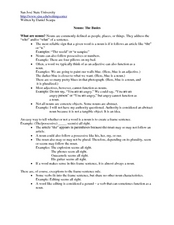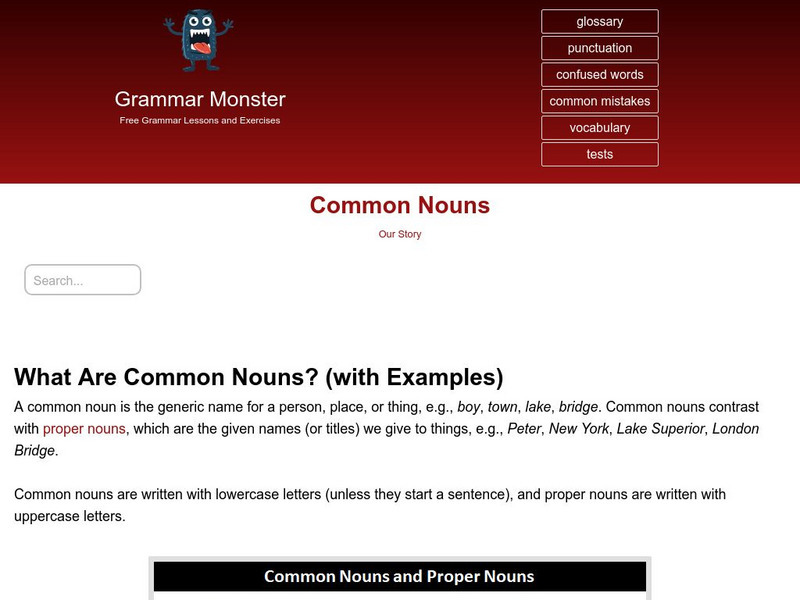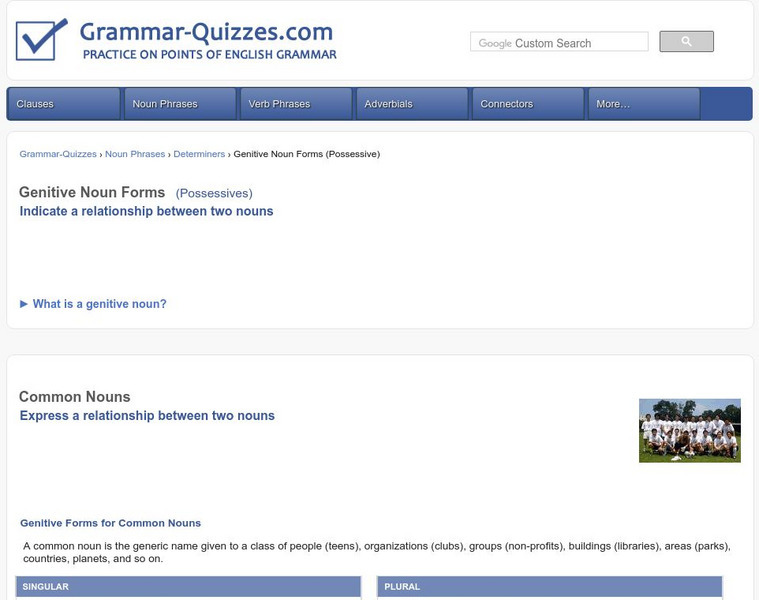San José State University
Nouns: The Basics
Need to work on nouns with your class? This handout breaks down nouns and provides twelve sentences for noun identification practice. Help English language learners recognize nouns with the examples given on this handout.
San José State University
Commonly Misused Words
After reviewing two pages of commonly misused words: effect/affect, accept/except, there/their/they're, etc., learners must choose the proper word in ten different sentences. Note: Answers are listed at the bottom of page three.
Gottlieb
Kennings vs. Stock Epithets – A Quick Review
Bone-crusher. Troll-wife. Battle-sweat. Blood-worm. What study of Beowulf would be complete without offering readers of this Old English epic poem an opportunity to craft their own kennings and epithets? Provide individuals with a copy...
San José State University
Parallelism
What is parallelism? Novice writers learn about parallelism and practice balancing 10 sentences for better syntax and parallel structure. A clear, straightforward worksheet with answers included.
San José State University
Prepositions of Time
On, at, in, since, for, during, within... what do all of these words have in common? They are prepositions and they are all prepositions that are included on this hand-out. This handout breaks down prepositions used when talking about...
Other
Grammar Monster: What Are Common Nouns? (With Examples)
Get a better understanding of nouns with definitions and examples of common nouns, examples of common and proper nouns, noun capitalization rules, common noun categories, and a video [5:21] on common and proper nouns.
Capital Community College Foundation
Guide to Grammar and Writing: Abstract Nouns
The composition of a noun is more than just a person, place or thing. Use this resource to study examples of nouns and their many uses.
TES Global
Tes: Nouns: Revision: Explanation Booklet
[Free Registration/Login Required] This seven-page resource provides definitions for different categories of nouns: common, proper, collective, hyphenated, compound, and abstract. Numerous examples with pictures are provided for each...
Grammarly
Grammarly Blog: Nouns
This page focuses on nouns including definitions, types of nouns (person, place, thing/idea), common vs proper nouns, types of common nouns (concrete, abstract, collective), nouns as subjects, nouns as objects, nouns as subjective and...
Capital Community College Foundation
Guide to Grammar and Writing: Nouns
A complete tutorial on identifying and using nouns that starts with identifying the nouns in "My Favorite Things" from The Sound of Music. Includes links to other noun grammar pages.
Other
Grammar quizzes.com: Possessive Nouns: Indicating Possession
A series of carts containing rules and examples of possessives including singular and plural common nouns, proper nouns, inanimate nouns, days and holidays, and numbers and letters. A fourteen-question practice exercise follows the...
University of Victoria (Canada)
University of Victoria: Study Zone: Regular Plurals of Nouns
Information and examples of how to make the regular plural form of common nouns.
Grammarly
Grammarly Blog: Capitalization: Family Relationships (Used as Proper Names)
This page explains that family relationships such as Mom, Dad, Uncle, and Aunt are capitalized if they are used as names, but are not capitalized if used as common nouns such as my mom, his dad, etc. Examples are provided.
Grammarly
Grammarly Blog: Comma Use Around Interrupters
This page focuses on the need for commas around interrupters in sentences and provides examples. Common interrupters include in fact, to say the least, however, generally speaking, sadly, happily, and unfortunately. Nouns of address can...
Other
Reading From Scratch: Spelling Rules
The "Reading from Scratch" site provides a list of spelling rules with examples.












